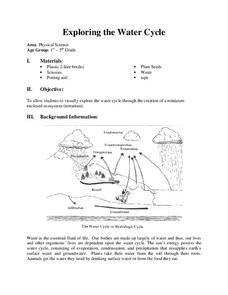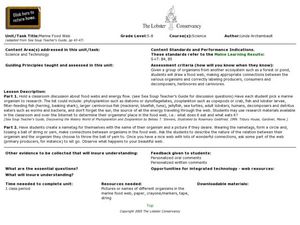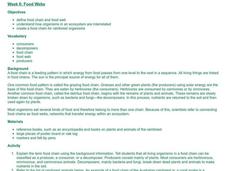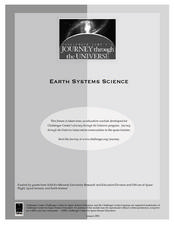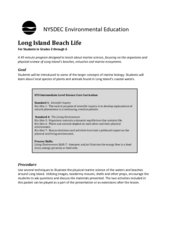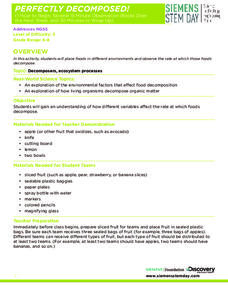Curated OER
Exploring the Water Cycle
Students investigate the water cycle. In this water cycle lesson, students create an ecosystem within a 2-liter bottle. Students record scientific observations as they observe the water cycle within their ecosystem.
Curated OER
The Living Environment
Students explore the cycles of an ecosystem. In this environmental science lesson plan, students work in groups to research the nitrogen cycle, the water cycle, or the oxygen-carbon dioxide cycle. Students prepare a PowerPoint or...
Curated OER
Marine Food Web
Students investigate the effects of the food chain on all animals by creating a food web. In this seafood lesson, students discuss energy flow and research a specific marine organism of their choice. Students create a food...
Curated OER
Food Webs
Students research rainforest animals and use that information to make a flow chart to show the order in which energy is transferred through several organisms. They label the producers, consumers, and decomposers in their chart.
Curated OER
Earth Systems Science
Learners perform experiments designed to grow plants and bacteria in a controlled environment. For this ecosystems lesson students investigate varying conditions for growing plants and bacteria.
Curated OER
Food Chains & Food Webs
Students examine the concepts of food chains and food webs. They trace back common food chains found in nature, demonstrate the interdependence of organisms through a food webbing activity, and analyze the flow of the food chain of a...
Curated OER
Mini-Ponds
In this mini pond worksheet, students create a mini-pond ecosystem with soil, water, and plant life. Students let their ecosystem sit for a day and they observe a sample the next day. Students identify all the pond water microorganisms...
Curated OER
Web of Wonder Lesson Plan
Students learn how all living things in an ecosystem are connected in some way. By building their own "web" your class look at energy flow through the food web system and how environmental changes disrupt the system.
Curated OER
Dirty Decomposers
Students explore the ecosystem by conducting a ziploc bag experiment. In this recycling lesson, students identify decomposer organisms in our environment and how they speed up the recycling process. Students utilize a ziploc plastic bag,...
Teach Engineering
Dirty Decomposers
Do not let the class just sit and rot. Pupils learn how decomposition and nutrient recycling is important to an ecosystem. Groups design an experiment to determine how environmental conditions affect decomposition. They develop a poster...
Curated OER
Owls: Top of a Food Chain
Although written for middle schoolers, there is no reason that a 3rd, 4th, or 5th grader could not also learn about food chains through the dissection of owl pellets. After you introduce the topic, learners complete an owl research...
Columbus City Schools
Photosynthesis and Respiration
Thirty percent of the world's oxygen is produced by rainforests found throughout the world. Seventh grade learners explore the processes of photosynthesis and respiration through 10 days of labs, manipulatives, and discussions. They...
Curated OER
Long Island Beach Life
Have your class learn about marine life through this resource. This comprehensive lesson has learners discuss marine life, learn key vocabulary, discuss environmental concerns, and play games related to migration and predator/prey...
Curated OER
Links in a Food Chain
Little ones make costumes and act out a rhyme in which there are daisies, bugs, wrens, snakes, and foxes that all interact in a food web. This would be a memorable activity for primary life scientists to participate in as a wrap-up...
Curated OER
Habitat survival
Sixth graders study different environments and how the food chain affects the survival of different animals. For this environments lesson plan, 6th graders share the visuals which describe the characteristics of the environment that they...
Curated OER
Introduction to Ecology
Eighth graders identify the living and nonliving components of an ecosystem. In this ecology instructional activity, 8th graders explain the role each organism plays. They participate in class discussion and answer a quiz at the end...
Discovery Education
Perfectly Decomposed!
We all know someone who won't eat the banana with a brown spot, the grape with a dimple, and the apple with a bruise. Scholars use different fruits to explore what happens when fruits really start to decompose. They set up an experiment...
Curated OER
Ecology
Fourth graders research an ecosystem and its endangered species. They create a PowerPoint Presentation, oral report, poster or a booklet based on their research. They research on the internet and in biology texts in teams of 4.
Curated OER
The Biosphere
In this biosphere worksheet, students identify the different levels of organization that ecologists study. Students complete charts, sentences, and answer short answer questions.
Curated OER
Oh, What a Tangled Web We Weave
Fifth graders investigate the food chain by viewing video clips. For this food web lesson, 5th graders investigate populations and ecosystems by viewing a video in class as well as visiting web sites. Students utilize the Internet to...
Columbus City Schools
Biome Basics with a Disastrous Twist
Bored with your current biome bag of tricks? This bundle is a bountiful bag of biome fun! Travel the globe with seventh graders and explore the biotic and abiotic factors that define our world's biomes. Then, introduce a little...
Consortium for Ocean Science Exploration and Engagement (COSEE)
Arctic Smorgasbord
Though the walrus spends roughly one third of its time on land, it eats organisms that live on the bottom of the ocean. The first in a series of five, the lesson uses a variety of plant and animal cards to have scholars build an arctic...
Curated OER
Life on the Ocean Floor
Why would water 2700 meters deep suddenly become warmer? Explore this and other ocean floor discoveries through this reading response activity. Scholars read information about the organisms discovered by Alvin, a deep-sea submersible....
Curated OER
Biofilms Are Everywhere
Students research biofilms and create brochures. They role play as advertising firm members assigned to educate the general public about biofilms. They create "wanted dead or alive" posters about harmful and helpful biofilms respectively.


